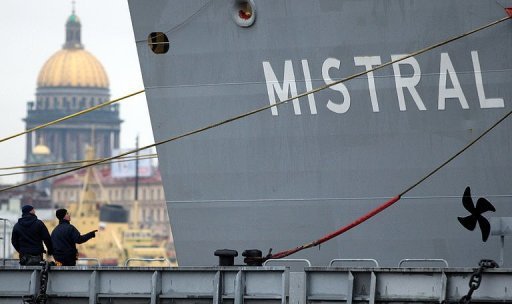
Paris S’excuse: French Officials Rationalize Naval Rearmament of Russia
Publication: Eurasia Daily Monitor Volume: 7 Issue: 18
By:

Part Two
While French officials improvise ad-hoc excuses on this matter, the French ambassador to the United States has exceptionally attempted a more comprehensive defense of the proposed Mistral deal with Russia. Responding to a letter of inquiry from six U.S. Senators, Ambassador Pierre Vimont made the following points in his letter:
“We have been keen to consult our partners, notably Georgia, before any move. We have to engage Russia constructively, so as to anchor it into a mutually beneficial partnership with Europe and NATO. France has used this [warship class] in particular for humanitarian missions, due to its transport and medical capabilities. The advanced communications equipment will not be exported to Russia. The proposed deal with Russia would not represent a credible threat to the North Atlantic alliance.”
Irrespective of his first point, however, Georgia has objected loud and clear to the Mistral sale, through Foreign Minister Grigol Vashadze in Paris last November, and President Mikheil Saakashvili most recently in the French press (Le Monde, January 15). Paris is also attempting to put a multilateral NATO and EU cover on a strictly bilateral Franco-Russian affair. Vimont implies that Russia might perhaps after all use this class of ship for philanthropic purposes, while he only addresses a possible aggravating circumstance (handover of advanced electronics) in the proposed transaction, but avoids the basic issue, which is about equipping the Russian navy with these powerful platforms for offensive operations. And his final point digresses from the issue at hand, which is not global, but theater-specific in the Baltic and or the Black Sea.
Following that exchange of letters (December 18 and 21, with copies to US Secretary of State Hillary Clinton in both cases), French embassy spokesmen have reprised those same points for Washington media in recent weeks. While France considers equipping Russia with four or five Mistral-class ships, Russia insists on basing its Black Sea Fleet on Ukrainian territory indefinitely and has recently practiced offensive operations with its Baltic Fleet, as part of the Zapad 2009 combined-arms exercises.
Asked recently about where Moscow might deploy Mistral-class ships, Foreign Minister Sergei Lavrov replied said cryptically that Russia is riparian to five seas (Le Monde, January 26). Apart from matching the maximum proposed number of ships under discussion, Lavrov follows Prime Minister Vladimir Putin’s line that Russia would use such ships “wherever they would be needed.” This seems to imply that Moscow would not accept restrictions on deployment, if the sale goes ahead.
A Mistral-class ship carries 16 attack and landing helicopters (while allowing the operation of up to 30 on both decks), 900 troops, four conventional landing craft (also allowing the operation of two hovercraft), and 40 Leclerc tanks, or alternatively 13 tanks and 40 other vehicles (https://www.netmarine.net/bat/tcd/mistral/histoire01.htm). These are the figures for short-term operations, which are primarily relevant to Russia for possible actions in theaters nearby.
NATO seems politically reluctant to face the implications of the proposed sale for the Alliance itself. Some member countries are reluctant to take up the issue with Paris, while some others (including apparently the Alliance’s leadership) seem unilaterally to shoulder the onus of resetting relations with Russia. However, serious examination of the proposed Mistral sale in NATO need not be construed as jeopardizing NATO-Russia relations. The more relevant issue is that of integrity of NATO’s internal consultation processes and procedures.
Moscow would like –and NATO seems about to tolerate– a new dispensation, whereby one or more allied countries would sell armaments to Russia in bilateral deals, uncoordinated with NATO and without objections from the Alliance. Ideally, from Moscow’s standpoint, European countries would ultimately even compete with each other on arms offers to Russia. Trying to induce such competition even now, Moscow continually hints at buying Dutch or Spanish warships, if France does not come to terms with Russia on the Mistral. Should this sale go ahead, other West European countries might well use it as a “precedent” for selling their own military production to Russia, with a similar disregard for the security of Russia’s neighbors. Moscow has already expressed its interest in purchasing the “soldier of the future” integrated kit “Felin” from France’s Sagem company (Izvestiya, January 12).
Some safeguards may be invoked outside NATO. These include the European Union’s Code of Conduct on Arms Sales, as well as the Wassenaar Arrangement on Export Controls for Conventional Arms and Dual-Use Goods and Technologies. However, these instruments are not legally binding; and relegating the issue to these arrangements would signify an abdication of NATO responsibility, further eroding confidence in the Alliance.
The Mistral affair should bring the wider issue of arms sales to Russia onto NATO’s agenda. The new NATO Strategic Concept, currently being drafted, provides a compelling opportunity to deal with this issue before it spins out of NATO’s ability to control.




